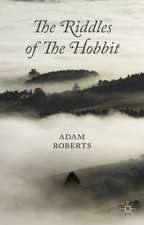Djuna Barnes's Nightwood: The World and the Politics of Peace
Autor Bonnie Roosen Limba Engleză Paperback – 24 feb 2016
| Toate formatele și edițiile | Preț | Express |
|---|---|---|
| Paperback (1) | 256.67 lei 6-8 săpt. | |
| Bloomsbury Publishing – 24 feb 2016 | 256.67 lei 6-8 săpt. | |
| Hardback (1) | 714.92 lei 6-8 săpt. | |
| Bloomsbury Publishing – 18 iun 2014 | 714.92 lei 6-8 săpt. |
Preț: 256.67 lei
Preț vechi: 294.96 lei
-13% Nou
Puncte Express: 385
Preț estimativ în valută:
49.12€ • 50.97$ • 41.06£
49.12€ • 50.97$ • 41.06£
Carte tipărită la comandă
Livrare economică 17-31 martie
Preluare comenzi: 021 569.72.76
Specificații
ISBN-13: 9781474275590
ISBN-10: 1474275591
Pagini: 240
Dimensiuni: 156 x 234 x 25 mm
Greutate: 0.32 kg
Ediția:NIPPOD
Editura: Bloomsbury Publishing
Colecția Bloomsbury Academic
Locul publicării:London, United Kingdom
ISBN-10: 1474275591
Pagini: 240
Dimensiuni: 156 x 234 x 25 mm
Greutate: 0.32 kg
Ediția:NIPPOD
Editura: Bloomsbury Publishing
Colecția Bloomsbury Academic
Locul publicării:London, United Kingdom
Caracteristici
Reads Nightwood against the historical backdrop of depression era politics, popular journalism and modernist culture
Notă biografică
Bonnie Roos is Associate Professor of English at West Texas A&M University, USA. Her previous publications include (as co-editor) Postcolonial Green: Environmental Politics and World Narratives (2010).
Cuprins
Introduction 1. History Lessons: Woodrow Wilson's Idealism and the Rise of the League of Nations 2. On Sleepwalkers and Alcoholism: Government Corruption and the Secret of Room '29 3. Circus Animals and Trainers: Marxist Lessons and the Truth about The World 4. The 'Seductions' of Capitalism: Fortune Telling, Ponzi Schemes and the Magnificent Marthe Hanau 5. On Matthew O'Connor's 'Neurasthenia' and the Wolf in Grandma's Clothes 6. The Fall of the League of Nations: Bad Loans, Bank Closures and Felix's 'Old Masters' 7. Déjà vu: the Gold Standard, the 'New Deal' and the Audacity of Swope 8. Herbert Bayard Swope and the End of The World Conclusion Bibliography Index
Recenzii
Nightwood, when celebrated at all, has traditionally been celebrated as a sort of sui generis glorious mess: critics are more likely to gesture toward it reverently than to engage it critically. In this entirely fresh and surprising reading, Bonnie Roos succeeds admirably in demonstrating just how carefully and cunningly wrought Barnes's novel is, and what prodigious cultural and political work it's still capable of. Roos restores to us the Nightwood that so entranced and menaced her editor T. S. Eliot, and in the process, pays tribute to the novel's ungovernable energies.
In her compelling new book Djuna Barnes's Nightwood: The World and the Politics of Peace, Bonnie Roos proposes a new critical perspective on this confounding modernist work of literature and puts Barnes in the company of other brilliant modernist writers who politicized their art. Roos helpfully reads Nightwood as intentionally allegorical in order to contend with the ways in which Barnes reveals how we both make and forget our collective histories. As Roos demonstrates through her deft readings of characters whom she aligns with historical figures prominent in the US and world popular presses at the time of its writing, Barnes's novel is much more than just an experimental, fragmented explosion of aesthetic pyrotechnics: Nightwood instead becomes a cautionary allegory of the twentieth century romance with capitalism which seems doomed to repeat itself in our twenty-first-century moment. Barnes thus, as Roos claims, asks her readers to fill in the silences predicated by dominant perspectives on history. Although she concludes that Barnes did not hold any optimistic belief that we could overcome our reliance on the hegemony of capitalism, Roos does suggest, through her carefully nuanced interpretations of the novel, that Nightwood prompts the question of how we might begin to "learn from history,.move.from reading to activism, from art to life" (29). A welcome addition to the existing scholarship on Barnes, Bonnie Roos's argument that Nightwood can best be understood as a narrative (re)presenting subaltern experiences of history in the twentieth century secures her rightful place in the canon of literary modernism
[...] an absorbing and illuminating study of a difficult work. By situating Nightwood in the political and social history of l'entre deux guerre, Roos has changed dramatically the critical discussion about Barnes and her intriguing novel.
In her compelling new book Djuna Barnes's Nightwood: The World and the Politics of Peace, Bonnie Roos proposes a new critical perspective on this confounding modernist work of literature and puts Barnes in the company of other brilliant modernist writers who politicized their art. Roos helpfully reads Nightwood as intentionally allegorical in order to contend with the ways in which Barnes reveals how we both make and forget our collective histories. As Roos demonstrates through her deft readings of characters whom she aligns with historical figures prominent in the US and world popular presses at the time of its writing, Barnes's novel is much more than just an experimental, fragmented explosion of aesthetic pyrotechnics: Nightwood instead becomes a cautionary allegory of the twentieth century romance with capitalism which seems doomed to repeat itself in our twenty-first-century moment. Barnes thus, as Roos claims, asks her readers to fill in the silences predicated by dominant perspectives on history. Although she concludes that Barnes did not hold any optimistic belief that we could overcome our reliance on the hegemony of capitalism, Roos does suggest, through her carefully nuanced interpretations of the novel, that Nightwood prompts the question of how we might begin to "learn from history,.move.from reading to activism, from art to life" (29). A welcome addition to the existing scholarship on Barnes, Bonnie Roos's argument that Nightwood can best be understood as a narrative (re)presenting subaltern experiences of history in the twentieth century secures her rightful place in the canon of literary modernism
[...] an absorbing and illuminating study of a difficult work. By situating Nightwood in the political and social history of l'entre deux guerre, Roos has changed dramatically the critical discussion about Barnes and her intriguing novel.
















